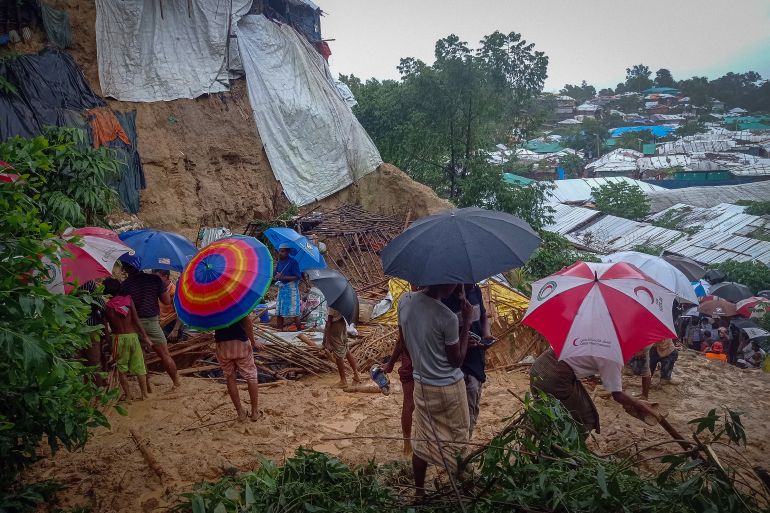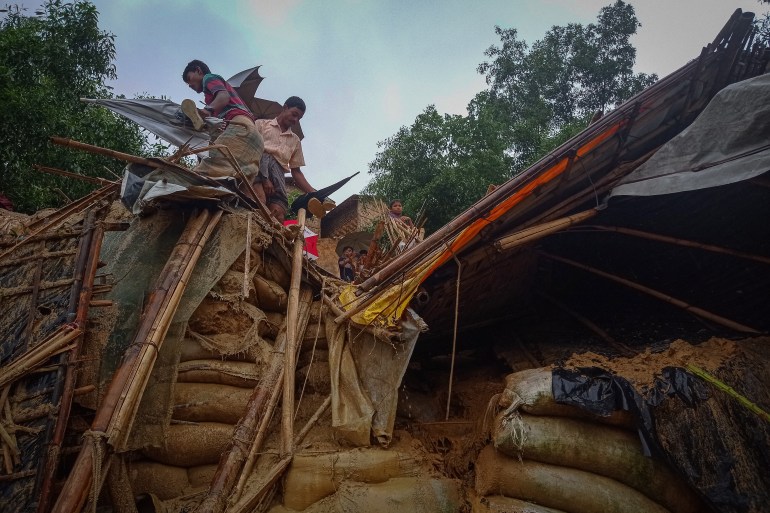Bangladesh evacuates 10,000 Rohingya after deadly landslides
Rohingya from refugee camps as well as local residents moved to safer areas in Cox’s Bazar after 14 killed in landslides and flash floods.

Bangladesh has evacuated 10,000 Rohingya from around refugee camps located in Cox’s Bazar district near the Myanmar border after at least 14 people were killed in monsoon-triggered landslides and flash floods, officials said on Wednesday.
After three days of torrential rain, the refugees, most of whom fled a military crackdown in Myanmar in 2017, were moved from hilly slopes around the Balukhali camp in Cox’s Bazar, refugee commissioner Shah Rezwan Hayat said.
Keep reading
list of 4 itemsMosque in Indian capital’s Rohingya camp bulldozed: Refugees
Bangladesh plans to vaccinate Rohingya against COVID: Official
Rohingya refugees struggle for vaccine in COVID-hit India
Tens of thousands of Rohingya who could not find room in the camps have cleared forests on the surrounding hills and set up shelters that have since been met with landslides every monsoon season.
“We have brought some 10,000 Rohingya to safe places after their shelters were hit by heavy rain and landslides,” Hayat told AFP news agency.
At least six Rohingya are among the dead and several others were injured, officials said. The other dead are local villagers whose homes were buried.

Cox’s Bazar district, where more than 850,000 Rohingya refugees are packed into 34 camps, has recorded more than 27cm (10 inches) of rain since Monday, according to weather authorities.
Bangladesh’s meteorological department said that “heavy and very heavy rainfall” was expected in cities like the capital Dhaka, Khulna and Barishal – with chances of landslides occurring in the Chittagong division.
About 7,000 local people outside the camps have also been moved to safety, officials said.
‘I don’t have anything’
Mohammad Salam, a 30-year-old Rohingya, his wife and three children were among those moved.
“My house collapsed yesterday. I don’t have anything. I have three children and they have started having fevers,” Salam told AFP.
The United Nations refugee agency in a statement said 2,500 shelters had been damaged or destroyed, while some 12,000 Rohingya have been affected by the floods.
We are deeply saddened by the deaths of six refugees due to severe weather events in Cox’s Bazar 🇧🇩
Persistent rain and strong winds continue; our emergency response teams are in the camps, working in coordination with the government, @Rohingya_ISCG and humanitarian partners. pic.twitter.com/MsSSwftTuJ
— UNHCR in Bangladesh (@UNHCR_BGD) July 28, 2021
“We are also aware of damage to facilities including health centres,” Hannah Macdonald, a UN spokesperson, told AFP.
Aid workers said a coronavirus lockdown in the camps, following a major spike in cases, has affected rescue work as authorities have halted what they consider non-essential visits.
About 740,000 Rohingya fled Rakhine state in Myanmar after security forces launched a clampdown in 2017 that the UN has said may amount to genocide.
Last month two Rohingya refugees were killed in separate landslides during heavy rain.
Fatalities from rain-triggered mudslides are common in Bangladesh’s southeastern hilly region during the monsoon season that generally lasts between June and September.
At least 149 people were killed in landslides in the districts of Chattogram, Cox’s Bazar, Rangamati and Bandarban in June 2017.
More than 120 others were killed in Chattogram alone in June 2007 due to mudslides caused by monsoon rain.